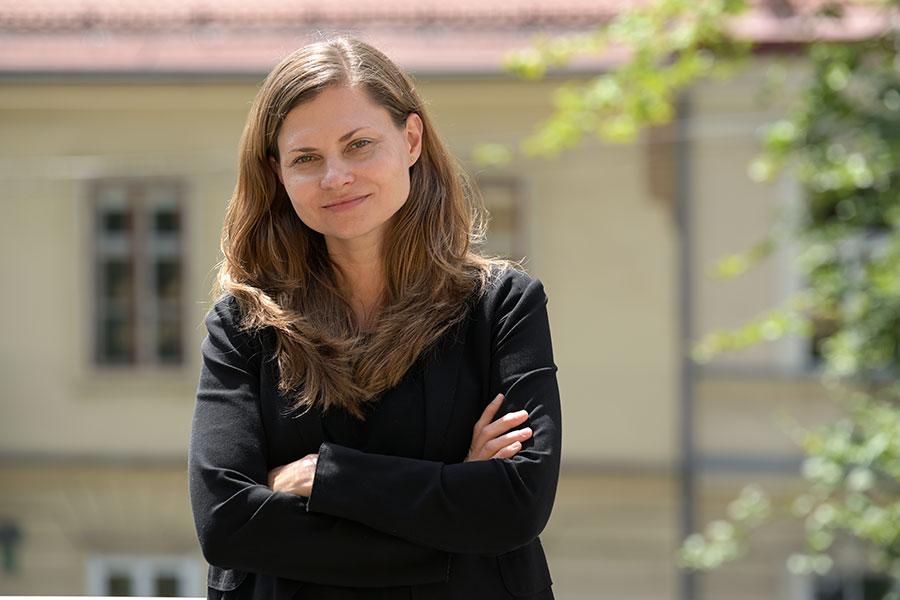Wenn wir den Klimawandel bremsen wollen, müssen die CO2-Emissionen drastisch gesenkt werden. Das erfordert eine radikale Neuorientierung von Wirtschaft und Gesellschaft. Welche Maßnahmen geeignet sind, um rasch nachhaltige soziale Veränderungen herbeizuführen, erforscht Ilona M. Otto. Die Soziologin und Ressourcen-Ökonomin hat seit Juli 2020 an der Universität Graz die neue Professur für Gesellschaftliche Folgen des Klimawandels inne.
Bei ihrer Arbeit setzt Ilona M. Otto auf innovative Methoden, wie etwa Social Simulations. Diese Kombination von Rollenspiel und Computersimulation kommt unter anderem im EU-Projekt REBOOST zum Einsatz: „Wir untersuchen, wie in Rumänien, Polen und Deutschland der Braunkohle-Ausstieg vorangetrieben werden kann, unter Berücksichtigung der Tatsache, dass derzeit gerade ärmere Gegenden von der Kohle abhängig sind“, berichtet die Sozialwissenschafterin. „Dazu lassen wir Stakeholder – zum Beispiel ManagerInnen von ansässigen Firmen, Mitglieder der lokalen Regierung, VertreterInnen von Büros für Regionalentwicklung und von sozialen Organisationen– an Social Simulations teilnehmen. Wir beobachten, wie sie in ihrer Rolle reagieren und welche Entscheidungen sie treffen. Das hilft uns, die Mechanismen des komplexen sozio-ökonomischen Systems mit den unterschiedlichen Interessen aller AkteurInnen besser zu verstehen“, erklärt die Forscherin. Das sei eine wichtige Voraussetzung für langfristig erfolgreiche Interventionen, denn Veränderungen brauchen breite Akzeptanz, um von Dauer zu sein. Ein weiterer Vorteil der Social Simulationen: Sie können in der Corona-Krise auch online durchgeführt werden.
Nachhaltige Investitionen
Eine Möglichkeit, nachhaltige Entwicklungen zu beschleunigen, ist das „Divestment“. Gemeint ist damit, Kapital aus kritischen Bereichen, wie zum Beispiel fossilen Rohstoffen, abzuziehen, um es in klimafreundlichere Alternativen, etwa erneuerbare Energien, zu investieren. „Die Forschung zeigt, dass wenn nur zehn Prozent aller Investitionen von Unternehmen, öffentlichen Institutionen und Privatpersonen umgelenkt werden, dies bereits einen Trend erzeugt, der Schule macht und weitere InvestorInnen überzeugt“, weiß Ilona M. Otto. Denn viele befürchten, Geld zu verlieren, wenn sie nicht rechtzeitig aufs richtige Pferd setzen. „Beim Divestment braucht es also nur eine kritische Minderheit, um rasch positive Veränderungen einzuleiten“, sagt die Sozialwissenschafterin.
Besser gerüstet
Die neue Professorin der Universität Graz leitet auch das EU-Projekt CASCADES. Hier untersucht sie, welche Kettenreaktionen Klimarisiken in verschiedenen anderen Bereichen auslösen können und mit welchen Anpassungsstrategien man die Gesellschaften in Europa widerstandsfähiger machen kann. „Der Klimawandel hat nicht nur wirtschaftliche Auswirkungen, er kann auch politische Systeme destabilisieren, wie etwa der Arabische Frühling gezeigt hat“, sagt die Forscherin. „Gestiegene Lebensmittelpreise in Folge von Ernteausfällen aufgrund von Dürren sind als Mit-Auslöser der Proteste zu betrachten.“ Es sei zwar nicht möglich, alles vorauszusagen, „aber wenn wir wissen, wo die Schwachstellen in unserem System liegen, können wir daran arbeiten, um besser gerüstet zu sein“, so Ilona M. Otto.
Sozialwissenschaftliche Umweltforschung
Die aus Polen stammende Wissenschafterin habilitierte sich an der Humboldt-Universität zu Berlin. In den letzten zehn Jahren war sie am Potsdam-Institut für Klimafolgenforschung tätig. Nun analysiert sie mit ihrer Forschungsgruppe am Wegener Center für Klima und Globalen Wandel der Universität Graz dynamische soziale Prozesse und Interventionen, um wirksame Maßnahmen für eine nachhaltige Transformation der Gesellschaft in den nächsten dreißig Jahren zu identifizieren. Ihre Professur erweitert somit den Profilbildenden Bereich „Climate Change Graz“ durch die Sozialwissenschaftliche Umweltforschung.
